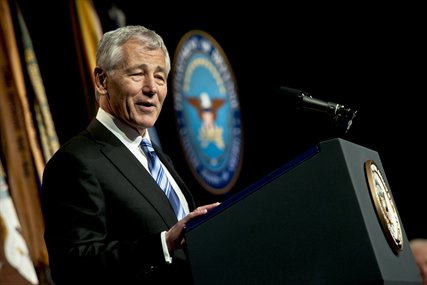
From Chuck Hagel, Department of Defense : The United States is emerging from more than a decade of war in Iraq and Afghanistan, but the threat of violent extremism persists and continues to emanate from weak states and ungoverned spaces in the Middle East and North Africa.
There also stands an array of other security challenges of varying vintage and degrees of risk to the United States: the proliferation of dangerous weapons and materials, the increased availability of advanced military technologies in the hands of state and non-state actors, the risk of regional conflicts that could draw in the United States, the debilitating and dangerous curse of human despair and poverty, as well as the uncertain implications of environmental degradation.
Cyberattacks – which barely registered as a threat a decade ago – have grown into a defining security challenge, with potential adversaries seeking the ability to strike at America’s security, energy, economic and critical infrastructure with the benefit of anonymity and distance.
The world today is combustible and complex, and America’s responsibilities are as enormous as they are humbling. These challenges to our security and prosperity demand America’s continued global leadership and engagement, and they require a principled realism that is true to our values.
The United States military remains an essential tool of American power, but one that must be used judiciously, with a keen appreciation of its limits. Most of the pressing security challenges today have important political, economic, and cultural components, and do not necessarily lend themselves to being resolved by conventional military strength. Indeed, the most destructive and horrific attack ever on the United States came not from fleets of ships, bombers, and armored divisions, but from 19 fanatical men wielding box cutters and one-way plane tickets.
So our military must continue to adapt in order to remain effective and relevant in the face of threats markedly different than those that shaped our defense institutions during the Cold War.
Since 9/11, the military has grown more deployable, more expeditionary, more flexible, more lethal, and more professional. It has also grown significantly older – as measured by the age of major platforms – and enormously more expensive in just about every area. . . .
The size and shape of the force needs to be constantly re-assessed, to include the balance between active and reserve, the mix of conventional and unconventional capabilities, general purpose and special operations units, and the appropriate balance between forward stationed, rotationally deployed, and home-based forces. We also need to re-assess how much we can depend on our allies and partners, what can we anticipate from them in capabilities and capacity, and factor these calculations into our short and long-term planning. . . .
During this period of budget turmoil, and after a financial crisis and a decade where our country has grown weary of war and skeptical of foreign engagements, questions arise about the merits of America’s global leadership.
America does not have the luxury of retrenchment – we have too many global interests at stake, including our security, prosperity, and future. If we refuse to lead, something, someone will fill the vacuum. The next great power may not use its power as responsibly or judiciously as America has used its power over the decades since World War II. We have made mistakes and miscalculations with our great power. But as history has advanced, America has helped make a better world for all people with its power. A world where America does not lead is not the world I wish my children to inherit.
More than a century ago on this campus, while laying the cornerstone on the building which now bears his name, President Theodore Roosevelt declared that the United States had “by the mere trend of events, been forced into a position of world power.” He went on to say that America “cannot bear these responsibilities aright unless its voice is potent for peace and justice…with the assured self-confidence of the just man armed.”
What distinguishes America is not our power, for the world has known great power. It is America’s purpose and our commitment to making a better life for all people. We are a wise, thoughtful and steady nation, worthy of our power, generous of spirit, and humble in our purpose. That is the America we will defend together, with the purpose and self-confidence of the “just man armed.”
Excerpts from remarks by Secretary of Defense Chuck Hagel at National Defense University, April, 3, 2013. (photo: Petty Officer 1st Class Chad J. McNeeley/Department of Defense)
Image: dod%204%203%2013%20Hagel.jpg
